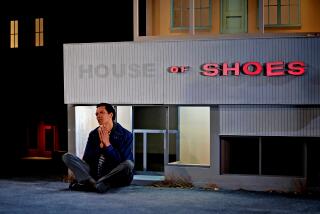STAGE REVIEW : Bearing the Pain of AIDS in âThe Way We Liveâ
âAt first he was just losing weight, he felt only a little ill, Max said to Ellen, and he didnât call for an appointment with his doctor, according to Greg, because he was managing to keep on working at more or less the same rhythm, but he did stop smoking, Tanya pointed out. . . .â
This is the verbal continuum in which Susan Sontag has written âThe Way We Live Now,â her short story about the moral dismay of the upwardly mobile friends of an AIDS patient. Call it stream of collective conscience and consciousness. It marks a return to the fold for Edward Parone, the Taperâs first associate artistic director and the founding director of its much lauded New Theatre for Now. Parone, who left the Taper in 1979, has adapted and directed this staged reading of the Sontag story for the Taperâs literary cabaret, Sundays at the Itchey Foot.
For the most part, his adaptation is tantamount to assigning voices to five actors sitting at podiums. Each playing several parts, they register their shock at their unnamed friendâs illness, their bewilderment at the rapid deployment of the disease among so many other friends, and their acute (if subliminal) fear for their own health.
On stage, this becomes a densely woven and accurate tapestry of an emotional journey, thick with apprehension, tinged with gossip and petty rivalries and quarrels and that suppressed, unspoken relief in the end that itâs him and not me --at least for now, at least so far.
The story tracks the friendâs deterioration and descent toward death, but concludes with him âstill alive.â More than just a documentation of the relentlessness of the disease, it is a study of massively ramified social implications. Keen, intellectual, smart.
Paroneâs actors--Janni Brenn, Francois Giroday, Gregory Itzin, Katherine McGrath and Christine Rose--successfully record the small vocal shifts that constitute transitions in this cerebral exercise--astonishment, indignation, confusion, annoyance, anguish, speechlessness. A look, a pause, a turn of the head, the slight raising of an eyebrow says it all. The hourlong show is like a miniature: All nuances are meticulously recorded in sharp, tiny strokes.
As such, âThe Way We Live Nowâ as a reading is absolutely faithful to Sontag. Not a comma seems omitted. But there is a downside to this fidelity: The story itself has a certain bloodlessness that carries over to the stage. In five voices it often sounds like the echo of crossing telephone lines, the product of endless if not idle conversations about someone whoâs not really there and therefore not quite real .
While this works admirably on the page, it remains distant on the stage that ultimately needs to provide a more direct emotional experience--something compelling or moving or involving. Much as we tune in to the situation intellectually, we as audience remain only concerned bystanders--interested, responsive, but separate.
Neither Parone nor the actors are to blame for this. It is merely a quality of Sontagâs writing which, for all its incisiveness, retains a certain detached coolness that becomes less bridgeable on stage.
At the Itchey Foot Ristorante, 801 W. Temple St., Sunday 1 p.m.; doors open at 11 a.m. for food and beverage service. Also March 5, 12 and 19 at 6 p.m.; doors open at 4 p.m. Ends March 19. Tickets: $6; (213) 972-7231.
More to Read
The biggest entertainment stories
Get our big stories about Hollywood, film, television, music, arts, culture and more right in your inbox as soon as they publish.
You may occasionally receive promotional content from the Los Angeles Times.










